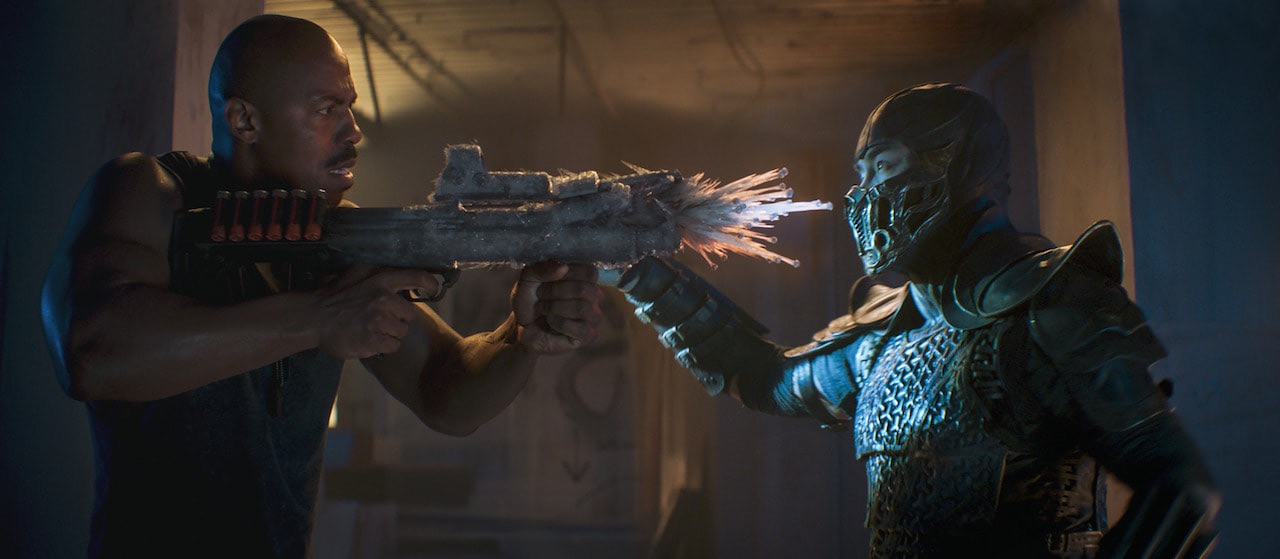Review:
"Mortal Kombat"

Release Date: April 22 (in theaters and on HBO Max)
Rating: R Running Time: 110 minutes No, the James Wan-produced Mortal Kombat reboot cannot be declared a flawless victory. But Wan and his handpicked director Simon McQuoid do succeed in their bid to relaunch a film franchise that was left for dead after 1997’s Mortal Kombat: Annihilation. This second attempt to turn the iconic martial arts videogame into a viable series of films treats its source material with a seriousness that the Paul W. S. Anderson-directed 1995 Mortal Kombat lacked but did not want or need. If Anderson presented his Mortal Kombatas the live-action equivalent of a swift and gaudy Saturday morning cartoon, Wan and McQuoid go in the direction of samurai cinema. This is a Mortal Kombatthat does not shy away from the carnage of the videogame. Its violent seven-minute prologue, set in 17th-century Japan, makes immediately clear that this Mortal Kombat refuses to be as kid-friendly as the version many consider to be the best videogame film. With his kunai blade attached to a long rope, ninja Hanzo Hasashi (The Wolverine’s Hiroyuki Sanada), a.k.a. Scorpion, viciously dispatches members of a rival clan that dare to attack his home. Hanzo even goes Gerard Butler on one assailant, plunging the knife into his head. Hanzo is eventually killed by Bi-Han (The Raid’s Joe Taslim), a.k.a. icemaker Sub-Zero, setting in motion the unapologetically bloody events of this exercise in martial arts mayhem. (To be honest, a Mortal Kombat focused on this feud between Hanzo and Bi-Han would have made for a better reboot, given the intensity of their initial confrontation.) McQuoid and credited screenwriters Greg Russo and Dave Callaham find new and interesting ways to end each fight in gory fashion. Sub-Zero uses his ability to control ice to freeze and shatter limbs. Combatants end up sliced in half, disemboweled, headless, limbless, or burnt to a crisp. Oh, and for every punch thrown, an F-bomb is dropped, or so it seems. Most of the salty language comes from Australian funnyman Josh Lawton, who, despite being bulked up as the cocky and morally dubious mercenary Kano, primarily serves as Mortal Kombat’s comic relief. Let’s be clear, though, all the fisticuffs in Mortal Kombat is not in service of the fight-to-the-death tournament held between different realms. Instead, like 1997’s ill-fated Annihilation, this reboot takes its cue from the Mortal Kombat 3 videogame, which dispenses with the tournament in favor of an unsanctioned battle between realms. Three centuries after killing Hanzo, Sub-Zero is assigned by Outworld ruler Shang Tsung (Skyscraper’s Ng Chin Han) to slaughter Earthrealm’s greatest champions in advance of the next tournament between the two realms. Shang Tsung wants his rivals dead to ensure a 10thand decisive victory over Earthrealm, which would allow the warlock to mount an invasion of the defenseless Earthrealm. Earthrealm’s mightiest heroes include videogame favorites Sonya Blade (Jessica McNamee), Jax (Mehcad Brooks), Liu Kang (Ludi Lin), and Kung Lao (Max Huang). They are joined by Cole Young (Into the Badlands’ Lewis Tan), a fighter created specifically for the film with no knowledge of the tournament or of his status as a champion by bloodline until he crosses paths with Sub-Zero. Sub-Zero is joined by fellow Outworld villains Mileena (Sisi Stringer), Nitara (Mel Jarnson), Reiko (Nathan Jones), Kabal (Daniel Nelson), and the four-armed half-human, half-dragon Goro (voiced by Insidious series costar Angus Sampson). Actually, Goro’s participation in this Mortal Kombat is a disappointment and speaks to the film industry’s unfortunate move away from practical effects to computer-generated imagery over the past two decades. In Anderson’s Mortal Kombat, Goro was played by actor Tom Woodruff, Jr. in an animatronic suit and operated by puppeteers. This not only lent Goro a formidable physical presence but allowed for true interaction between Woodruff and his fellow cast members. In this reboot, Goro is nothing more than a monstrous CG creation lacking personality. Standing between Outworld and Earthrealm is the latter’s protector, Lord Raiden (Ichi the Killer’s Tadanobu Asano). Tadanobu Asano’s Lord Raiden is cut from a different cloth than the Thunder God portrayed by Christopher Lambert in the 1995 Mortal Kombat. Lambert brought moral authority and a philosophical sense of humor to Lord Raiden. Asano’s Lord Raiden is impatient, curt, and confrontational. This Lord Raiden does not know how to bring out the best in his potential champions. He certainly is no help when it comes to Cole trying to unlock his arcana, the superpower that he needs to defeat his Outworld adversaries. Despite displaying impressive fighting skills, Tan does not bring much of an edge to Cole, a once-proud MMA fighter now reduced to being a human punching bag for $200 a match. This is not entirely Tan’s fault. Mortal Kombat makes the mistake of placing the burden of carrying this inter-realm showdown on the shoulders of a new and unfamiliar character, one whom credited screenwriters Greg Russo and Dave Callaham find more interesting as a family man than potential savior of Earthrealm. So our focus naturally gravitates away from Cole to Jessica McNamee’s tough-as-nails Sonya Blade, Mehcad Brooks’ brash, cyber-armed Jax, and Josh Lawton’s mouthy Kano. Also, Mortal Kombat makes the mistake of positioning itself as a true origin tale. Whereas Anderson’s Mortal Kombatgave us tried and true champions ready for the tournament, this reboot finds our heroes inexperienced and unproven in battle. So Cole, Sonya, and Kano spend the entire second act in training. The process is so drawn out and unremarkable in execution that it brings Mortal Kombat to a grinding halt after a fast start. Surely director Simon McQuoid knows he could use montages to depict training sessions in expeditious fashion? McQuoid makes amends with a finale that combines dexterously staged one-on-one and group combat, even if the setting of the showdown between Cole and Sub-Zero prompts a huge groan. While McQuoid is very much in his element when it comes to choreographing the combat, he struggles to make Mortal Kombat visually dynamic. Most of the action is confined to bland real-world locations. Even Lord Raiden’s hidden temple is less hallow ground than drab desert hideaway. In contrast, Anderson dropped his contestants into imaginative and vibrant deathtraps that influenced the way the fights played out. The lack of a tournament in this Mortal Kombat is a drastic error, one hopefully that can be reversed in sequels to come. And, as expected, Mortal Kombat ends with the promise of more fighting. And with established characters from videogame who glaringly sat out this reboot. “Today we are victorious,” Lord Raiden says to his surviving champions at the end of Mortal Kombat. “But there are other enemies to fight. We cannot let our guard down. I’ll assemble a new list of champions. You must find them.” Johnny Cage, get ready to test your might. Robert Sims Aired: April 29, 2021. Web sites: https://www.warnerbros.com/movies/mortal-kombat-2021 https://www.facebook.com/MortalKombatMovie |
|
